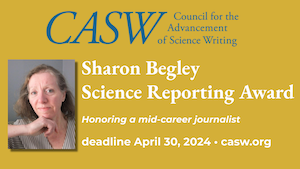... & conservation biology & human evolution & language & diplomacy. How not to write about observational/association studies. Deric Bownds' Mindblog & oxytocin & vasopressin & love's distresses.
[We have an RSS feed. No orange icon, but click here. If that doesn't work, the URL is http://www.nasw.org/rss.xml]
DARWIN'S 201st BIRTHDAY TODAY, FEBRUARY 12. Suffering from Darwin fatigue after all the bicentenary and sesquicentenary celebrations last year? Then begone. At least once a year we should contemplate how essential Darwin's ideas really are, which is probably why they have radiated into nearly every corner of existence. To adapt Sam Johnson, if you're tired of Darwin, you're tired of life.
Begin — where else? — with the latest on Darwin's finches. The evolutionary biologist GrrlScientist, at Living the Scientific Life, riffs at length on a new finch paper in PLoS One. The researchers show that one of Darwin's finches, the medium ground finch Geospiza fortis, displays an immune response to two parasites that recently invaded the Galapagos even though the birds have never encountered the parasites before.
It's a long post that describes the study in detail. But it also explores other topics, for example why — unlike Hawaii and many other places — no Galapagos birds have gone extinct. She wonders whether there's something to be discovered about the Darwin finch's immune response that might help save threatened populations elsewhere.
Biologist Ursula Goodenough is also contemplating the evolution of finches — in this case drawing parallels with the evolution of Homo sap and our invention of language. She's at the newish National Public Radio blog 13.7 Cosmos and Culture. (13.7 is an orphic reference to the age of the universe. I knew you'd ask. Readers are on their own to supply the billion-year unit of measurement.)
Goodenough's is an Asian finch, the white-rumped munia Lonchura striata. One thousand generations of selective breeding for the bird trade has generated Lonchura striata var. domesticus, aka the Bengalese finch. The Bengalese are said to sing like mad in no particular arrangement and learn songs from others easily, including songs of wild munia. The wild ones, however, have a rigidly defined song and don't seem to learn from Bengalese.
The Bengalese songster may be an example, Goodenough speculates, of how some traits can flower when they escape from selective constraints. In the wild, natural selection would quickly get rid of a munia that didn't sing like the other guys; he probably couldn't find a mate and therefore could pass no vocal idiosyncracies to the future. That selection pressure vanishes with deliberate breeding.
Something similar may have happened as hominids evolved from apes, and human culture became central to our existence, she suggests. "Selection pressures that operated to sustain instincts important for survival in prior niches would be expected to relax as humans became increasingly dependent on their self-created cultural niches, while any innovations that facilitated cultural adaptation — in this case, innovations in language competency — would be expected to spread."
Another 13.7 contributor, the top science writer K.C. Cole, muses on how science — learning about evolution, for instance — can change minds and therefore possibly change the world for the better. Evolution spreads wide its wings, way beyond finches.
EVOLUTION BY THE BOOK. It's not a blog, but Darwin Online is the central repository of all things Darwin and must therefore be mentioned here. Free, of course. All the notebooks, all the papers, all the books, audio versions, variorum versions, Portuguese versions, you name it. User guide here.
You may enjoy grad student Michael Barton's account of what happened after he wrote about moving anti-Darwinist and intelligent design books from the science section to the religion section at a local bookstore. At Pharyngula, PZ Myers recommends Evolution: How We and All Living Things Came to Be, Daniel Loxton's book on evolution for kids. And at Gene Expression, Razib Khan describes why, when reading On the Origin of Species, he came to believe Darwin was a genius.
We can do no less. Happy birthday, C.R., and many thanks.
HOW TO WRITE ABOUT OBSERVATIONAL ("ASSOCIATION") STUDIES. My heart went pitter-pat when I read, on tweets from Lynne Friedmann and Bob Finn, thank you both very much, that a post at Health News Review was giving guidance on this very tough science-writing problem. How should we write about the equivocal quality of evidence that emerges from observational ("association") studies? By contrast, well-designed randomized clinical trials can yield up much more trustworthy findings. How can we best explain to readers that association studies can never be the last word?
I was thrilled in part because some years ago I had to spend about 20% of a feature explaining to biologists why association studies were preventing behavioral genetics research from being taken seriously. I yearned for an easy solution to that demanding assignment. But it turns out my heart rate zoomed unnecessarily.
The piece is quite useful in explaining the differences between the two kinds of research and why it matters. However, suggestions from authors Mark Zweig and Emily DeVoto for how this can be explained to readers don't strike me as particularly satisfactory.
I mean no denigration when I say this. Zweig and DeVoto are brave to try, but I think this is a problem nearly impossible to solve in ways that will deliver information that is both clear and succinct. (Forget, for the moment, felicitous.)
Take just this one example, their approach to describing an observational study of dietary fat and age-related maculopathy that found a 40% reduction in this eye disorder to be associated with weekly fish consumption. The hypothetical journalist version was crisp and, to me, perfectly respectable: "Eating fish may help preserve eyesight in older people."
But Zweig and DeVoto think this approach makes the finding sound too causal. Their suggested language: "People who ate fish at least once a week were observed to have fewer cases of a certain type of eye problem. However, a true experimental randomized trial would be required in order to attribute this to their fish consumption, rather than to some other factor in their lives. This was an observational study — not a trial."
Here I was tempted to write ROTFL. But let me reach for some dignity and ask this instead: Breathes there a newspaper or magazine editor who would let this lede pass unscathed?
It's not just wordy and clumsy, it's not even very clear. What type of eye problem? What's an experimental randomized trial? Does it differ from a true experimental randomized trial? What's an observational study? And what about that last word, "trial?" What percentage of readers will have forgotten that its mention a few words back was preceded by "true experimental randomized" and instead associate it with "Law and Order?"
The Zweig-DeVoto solution might be near-tolerable in a press release intended to be read only by other writers who will try to turn it into something simpler and clearer — a risky assumption in these times, when news sites run press releases verbatim. But even if that was not true, you would have to then spend a lot of the press release explaining what these terms mean, because a significant percentage of your writer audience wouldn't understand them either.
In short, their alternative wording creates more problems than it solves.
I don't even agree that the journalist's approach is too causal, although I agree, shamefaced, that the weasel-word "may," which Webster knows I have used often enough, is, well, weasely. More important, "may" probably won't do the job of tipping off most readers that they should consume the reported finding with several grains of NaCl.
I'm too chicken to take a crack at doing better, because as I said above, I don't see a good solution. About the best I can offer is something like this in the second or third or fourth or fifth graf: "This study does not prove that eating fish lowers the risk of developing eye problems as we age. It's possible the lowered risk was due to some other factor in the research subjects' lives."
Offhand I can't think of one editor I have worked with who would greet those sentences with enthusiasm. I would have to argue hard to get them retained, even in the fifth graf. And I might well lose the argument.
Furthermore, some of the editors might then ask this uncomfortable question: "If the results of this study are so tentative and unpersuasive, why are we running a story on it?"
This is not a question you want an editor to ask.
ANOTHER BIRTHDAY CELEBRATION. This week is the fourth anniversary of the fine Deric Bownds' Mindblog. Bownds, among other things, directs the Program in the Biology of Mind at the University of Wisconsin, Madison. Its announced province is "the evolution, structure, and function of the minds of humans and other animals."
Select a Mindblog post at random and it will probably reward you. Here's his anniversary post, from Monday.
Bownds also reports regularly on the literature. Here's a post from Wednesday, describing a paper on the physiology of distressed relationships.("Relationships" in its current sense, meaning sexual relationships, although the paper discreetly calls them "pair bonds.") The paper shows that the hormones oxytocin and vasopressin may (weasel alert! weasel alert!)serve as biomarkers for relationships that are in trouble.
At first I was intrigued, but then began to wonder about the point of trying to validate those biomarkers. Assuming the findings hold up (remember, it's one of those "may" studies, meaning that the results could be "due to some other factor in the research subjects' lives"), why would lovers do this? Why would they go to a doc, request that blood be drawn, and undergo studies, no doubt expensive studies, of their oxytocin and vasopressin? Who would order such tests? The pair that was coming unbonded would presumably already know they were distressed. Wouldn't they? Do people really need a blood test to know when their SOs are making them crazy?
Happy Valentine's Day.
.png)

